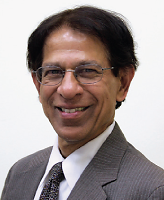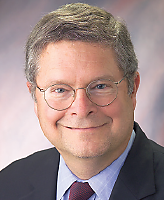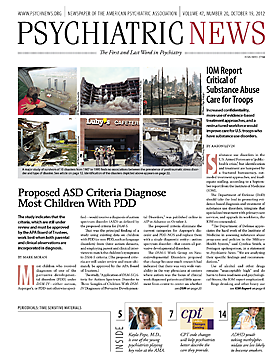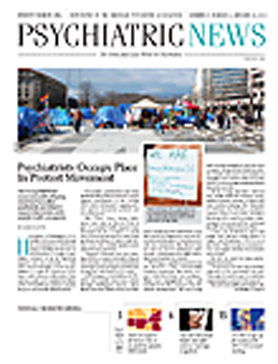Dilip V. Jeste, M.D.
Sleep is one of the most important aspects of our lives, as well as that of all other mammals. As professionals, we have to deal with our own issues related to sleep in the world of everyday stresses of life along with changing time zones, noisy hotel rooms, and pressures of performance. As clinicians, we know that sleep problems are among the nearly universal and most distressful complaints by patients and their caregivers. Sleep disorders is an area where different medical specialties interact, including psychiatry, neurology, pulmonology, pediatrics, and geriatrics, to mention a few prominent ones. The management of sleep disturbances is made particularly challenging by a dearth of safe, effective, and affordable pharmacotherapies for sleep disorders.
I requested Charles F. Reynolds III, M.D., an internationally renowned expert in sleep disorders and chair of the DSM-5 Sleep-Wake Disorders Work Group, to summarize the state of the art in this field from the perspective of a psychiatrist clinician.
Charles F. Reynolds III, M.D.
“Sleep knits up the raveled sleeve of care,” Shakespeare wrote, thereby underscoring the central importance of sleep to health.
Practicing psychiatrists appreciate the impact of sleep disturbances as part of the clinical presentation of mental illnesses, as core symptoms of mood, anxiety, cognitive, and substance use disorders. Sleep disturbances often amplify the disability of common mental disorders, further eroding health-related quality of life. Since the publication of the DSM-IV, we have come to understand much more about the bidirectional relationship between sleep disturbances and mental illness. Both chronic insomnia and hypersomnolence represent strong risk factors for the subsequent onset of mental disorders, such as depression, anxiety, and substance use disorders. At the same time, the persistence of sleep disturbances beyond episodes of mental illness puts the patient at risk for a chronic, relapsing course of mental illness. Treating sleep disturbances may well be a form of preventive medicine in psychiatry, reducing the incidence of first and recurrent episodes of illness. Sleep disturbances in the clinical presentation of mental illness may also furnish important clues about coexisting medical or neurologic disorders.
The overarching point underscored by these observations is that sleep disturbances, while representing important symptoms of mental illness, also often indicate the existence of sleep disorders that co-occur with common mental illnesses and warrant independent clinical attention. This is the central point in the proposed DSM-5 reconceptualization of sleep-wake disorders. Clinicians should specify coexisting psychiatric and other medical conditions when they ascertain a diagnosis of insomnia disorder or hypersomnolence disorder. By doing so, a comprehensive treatment plan encompassing both mental illness and co-existing sleep disorders can be facilitated.
There are several questions that I am asked frequently by psychiatrist colleagues relating to their care of patients with sleep complaints. Summarized here are strategies for dealing with common clinical scenarios.
•.
What hypnotic is safest for my patients? The science of sleep disorders medicine provides strong evidence for the use of learning-based behavioral approaches to managing chronic insomnia, rather than the use of sleeping pills per se. At the heart of behavioral approaches lie such strategies as keeping a regular sleep-wake schedule, limiting time in bed to about seven to eight hours a day, and using the bedroom for sleep and not for worrying or work. Hypnotics may be used appropriately as a short-term adjunct to behavioral strategies. Medications with short elimination half-lives are generally preferable because they are less likely to lead to daytime hangover.
•.
Should I take melatonin to reduce jet lag? There is some evidence that using melatonin for several days before transmeridian travel and several days upon arrival may reduce jet-lag symptoms. However, I favor behavioral approaches, including brisk physical activity and sunlight exposure, as a way of adapting to a new time zone and reducing jet-lag symptoms.
•.
Is a glass of wine good before going to bed? Alcohol can help to reduce the time it takes to fall asleep by dampening arousal, but there is often rebound wakefulness during the night following the metabolism of alcohol. And if a patient snores loudly, then use of alcohol before bedtime may increase the risk for breathing-related sleep disorders, such as obstructive or central sleep apnea or hypoventilation.
•.
When should I order a sleep study? Patients presenting with excessive daytime sleepiness often require polysomnography to elucidate the causes of their daytime sleepiness. The differential diagnosis of daytime sleepiness includes inadequate nighttime sleep, breathing-related sleep disorders, narcolepsy/hypocretin deficiency syndrome, and hypersomnolence not elsewhere classified. Having objective validation of the diagnosis facilitates personalized treatment approaches, including the use of psychostimulant medication in appropriate ways.
I recommend to my psychiatric colleagues that they refresh their knowledge of basic sleep physiology because of its strong relevance to the practice of psychiatry. The proposed DSM-5 sleep disorders classification will present an updated set of diagnostic criteria for NREM arousal disorders (such as sleep walking and night terrors), REM sleep behavioral disorder (often a harbinger of alpha synucleinopathies, such as Parkinson’s disease), restless legs syndrome, and circadian rhythm sleep disorders. Particularly impressive has been recent scientific progress in understanding the molecular basis and CNS mechanisms of circadian timekeeping, narcolepsy/hypocretin deficiency, and breathing-related sleep disorders. In its use of genetic and pathophysiological biomarkers to aid diagnosis, sleep disorders medicine represents a strong integration of clinical, translational, and basic brain science.
On a concluding note, I’d like to make a pitch for more young psychiatrists to do postresidency one-year fellowships in sleep disorders medicine. This step establishes “added qualifications” necessary to take the ABPN subspecialty board exams in sleep disorders medicine. We are underrepresented in this field, despite the fact that sleep is of the brain, by the brain, and for the brain—our organ.
My colleagues and I are organizing a symposium on
DSM-5 sleep-wake disorders for APA’s 2013 annual meeting in San Francisco. I hope that you will consider participating.




